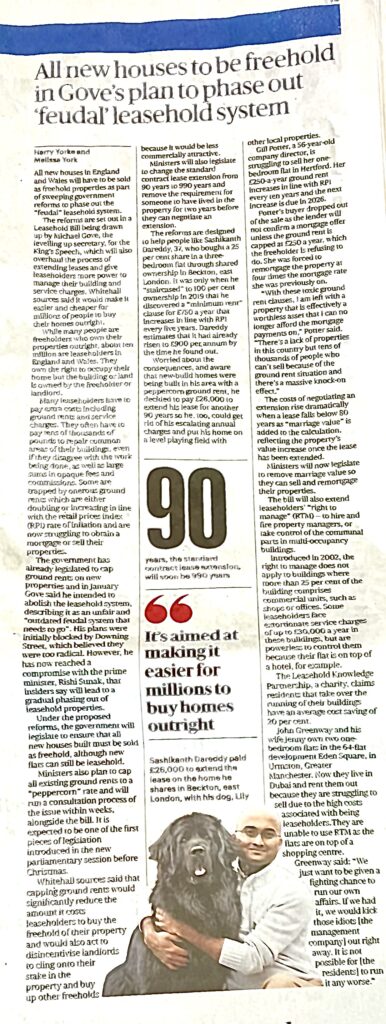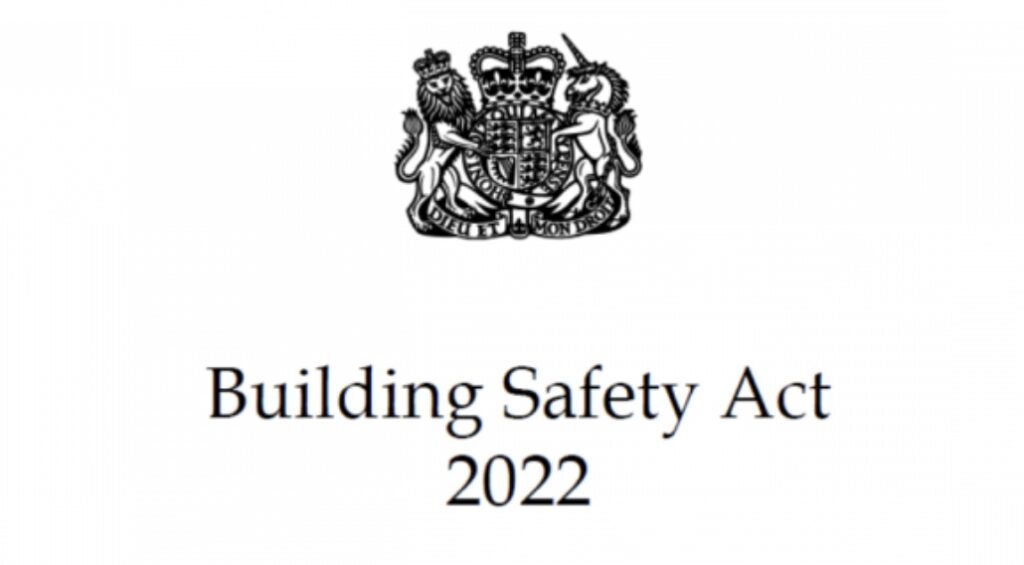We have all been awaiting some comment on what the King’s Speech May have in store. This article by Harry Yorke and Melissa York in the Sunday Times on 29th October sets out quite a lot of detail.

What is this all about ?
The Sunday Times today has article that sets out some predictions about the proposed reforms.
Given the government’s track record on putting things out by ‘official leak’ perhaps this is accurate?
The article by Harry Yorke and Melissa York seems to have access to some background information – mentioning that Mr Gove’s initial plans to ‘abolish leasehold’ were blocked by Downing Street as being ‘too radical’ but that a compromise has now been reached and that there are therefore plans in the offing.
If all of this is right, what do we have to look forward to? If the predictions in the article are correct, here are some highlights:
Capping ground rents
Plans to restrict ground rent to a more modest level; presumably by reference to a fraction of market value or a set sum? We can only speculate at this stage. But this would deliver on an earlier promise and as the article says would detract from the investment value of ground rents.
This would be a further step forward from banning ground rents for new leases as they have been under the Leasehold Reform Ground Rent Act 2022. This change would apply to existing leases.
According to the article plan the government plans to ‘run a consultation process [on] the issue within weeks, alongside the bill. It is expected to be one of the first pieces of legislation in the new parliamentary session before Christmas.’
If the source is correct, then it sounds like there is a plan for some immediate action.
Banning leasehold houses
This is an old chestnut and has been much promised, particularly in the early days of the leasehold scandal.
Ensuring that no house (properly so called) is leasehold will end any ground rent abuses; although there may be still limited circumstances in which this is necessary – but then only presumably when there is a ‘material overlap’ with other premises or a genuine need for a leasehold structure for service charge reasons.
In my view the other actions around ground rent and and the interventions of the CMA have effectively stopped the issue of escalating ground rents and leasehold houses. However, this was a ministerial promise and is therefore one that the government will want to deliver on and in drafting terms it is something of an isolated change and one that could therefore be made now, outside of any wider reforming legislation.
Making lease extensions 990 years long
This has been promised since Robert Jenrick first announced this when he was Housing Minister back on the 11th January 2021. It would be an easy change to make – thereby avoiding the need to extend ever again. Presuming that the statutory break rights are repeated at the term intervals and each 90 year term will mean consistency of estate management.
In valuation terms the difference in price will not be at all significant and this would be a big practical help to leaseholders.
Ending the two year rule
A very long time ago (well 15 years to be precise) when the the late Alex Greenslade and I drew up a shopping list of potential reforms to take to government on the part of the then newly formed ALEP – this was on top of the list.
In my view this is a common sense change that probably almost everyone can agree on and would be a simplification of both procedure and process, and a de-risking of the situation for buyers.
It would also harmonise the position as regards collective enfranchisement where you can participate from the ‘get go’ as a new owner and do not need to wait to be the registered owner for two years.
Anecdotally in practice I expect this deters a lot of people from joining in with collectives as they are under the mistaken assumption that they don’t qualify when in fact they do.
Reforming the law on RTM
The article says that the new law will also ‘extend the right to take control in multi-occupancy buildings.’ The suggestion may be that we are back to the question of whether the current position where the Right to Manage (RTM) cannot be exercised in relation to buildings where more than 25% is in non-residential use should be reformed.
There have been consultations about changing this threshold to 50%. There is also the issue as highlighted in ‘Settlers Court’ as to whether an RTM can take control of estate common parts outside the property. Currently this cannot be done, where there are shared areas. It is possible that this could also be up for a change so that perhaps the tribunal might be able to decide upon or share out responsibilities in such a case?
And finally, the big one: Banning marriage value
The article says that ‘ministers will now legislate to remove marriage value’ so that people with toxic ground rents can remortgage or sell their properties.
The article does not make clear if this will be as part of the same wave of legislation that is promised or at a later date. However, this is the ‘big ticket item’ and the one thing that would change things significantly for leases that are under 80 years.
Comment
The government has a game of ‘catch up’ to play, having made a lot of promises and now needing to deliver on these.
If these changes are announced then this will go some way towards delivering on these – but the article doesn’t mention what a lot of people have said could be a big issue around banning ground rents – which is the possibility of a human rights act challenge. The context of all of the valuation changes will have to be looked at carefully once the nature and scope of these are known.
The general thinking has been that the reforms on valuation would be better set in the context of a much wider and broader reforming piece of legislation, but it may be in fact that this is what the government has planned.
So, are the above predictions entirely accurate ? We will have to wait till Tuesday 7th November to find out.
Mark Chick
29th October 2023




